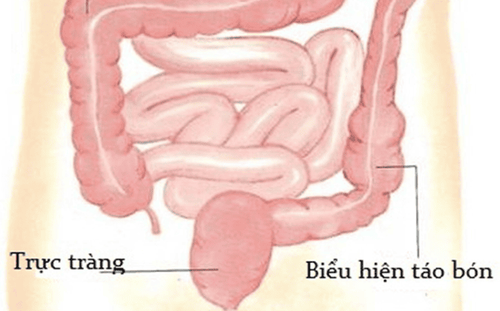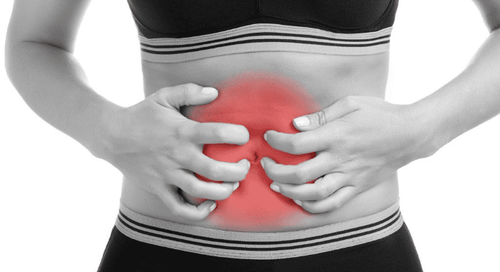This is an automatically translated article.
Post by Master, Doctor Mai Vien Phuong - Gastrointestinal Endoscopy - Department of Medical Examination & Internal Medicine - Vinmec Central Park International General Hospital.
Constipated irritable bowel syndrome is a type of irritable bowel, other types include IBS with diarrhea (IBS-D). Although all types of IBS can cause changes in bowel movements along with abdominal pain, there are more obvious symptoms if you have constipation-type irritable bowel syndrome.
1. What is constipation-type irritable bowel syndrome (IBS-C)?
Irritable bowel syndrome with constipation (IBS-C) is a chronic gastrointestinal (GI) disorder that causes bloating, frequent abdominal pain, and difficulty passing stools. While not life-threatening, IBS-C can be extremely uncomfortable and interfere with your daily activities.There is no cure for irritable bowel syndrome with constipation, relying mainly on lifestyle and dietary changes along with the help of medications that target your symptoms.
If you suspect you may have constipated irritable bowel syndrome, learn more about the typical signs and symptoms of this condition and what you can do to relieve them.
2. What are the signs and symptoms of IBS-C? IBS itself is a relatively common digestive disorder, affecting about 7-21% of people in the United States.
Constipated irritable bowel syndrome is another type of irritable bowel including IBS with diarrhea (IBS-D). Although all types of IBS can cause changes in bowel movements along with abdominal pain, there are more obvious symptoms if you have constipation-type irritable bowel syndrome.
Some of the more common signs and symptoms of IBS-C include:
Abdominal pain Abdominal bloating Feeling of a rock or mass in your stomach Infrequent bowel movements (three or less per week) Stools stiffness or lumps Feeling unable to have a bowel movement completely With constipation-type irritable bowel syndrome, after you have a bowel movement, symptoms of bloating and abdominal pain may temporarily go away. However, these symptoms tend to return.
What makes IBS-C different from regular constipation is that it causes significant bloating and pain that you probably wouldn't experience if you were constipated. IBS does not cause bloody stools or unintentional weight loss.

IBS brings on underlying inflammation in the digestive tract, which may also be related to previous bacterial infections or changes in your immune system.
Another possibility is that the relationship between your brain and gut may be altered, so your brain is not providing the proper signals to regulate bowel movements.
4. How is IBS-C diagnosed? There is no test to determine if you have IBS-C. IBS is also not diagnosed with imaging tests or blood tests, although these tools can be used to rule out other conditions.
Instead, your doctor will diagnose your condition largely based on signs and symptoms. It's important to monitor your symptoms of constipation, along with the duration and severity of abdominal pain and bloating. These are the key features that distinguish IBS-C from common constipation.
A physical exam can also help your doctor diagnose irritable bowel syndrome with constipation. This condition can often cause marked abdominal distension. They may also gently press on your abdomen to assess the associated pain.
5. How is IBS-C treated? IBS-C treatment focuses on reducing symptoms and improving your overall quality of life. Although IBS cannot be cured, treatments can help reduce bloating and pain and improve bowel movements.
Medication Your doctor will probably recommend over-the-counter (OTC) constipation treatments first. Options include fiber supplements, laxatives, and stool softeners.
Certain “detox” teas can also have a similar laxative effect that you can discuss with your doctor. The idea is that softening stools and increasing bowel movements will improve other uncomfortable symptoms.
If OTC options don't work, you may need prescription medication. Antispasmodics are used to help relax your digestive tract.
Another option is a new class of drugs called secretagogues. These substances help IBS-C by softening stools in your intestines. You may find bowel movements more frequent and easier. Selective serotonin reuptake inhibitors (SSRIs), a class of antidepressants, may also be helpful in improving brain-gut interactions. These may also help improve symptoms secondary to IBS-C, such as anxiety and depression.

Lifestyle remedies Lifestyle remedies should be maintained throughout life. Getting enough sleep and exercising daily can help regulate bowel movements, reduce stress, and improve underlying inflammation.
Diet Before trying a fiber supplement for IBS-C, you might first consider increasing soluble fiber in your diet. Sources include oats, barley, and flaxseeds. You may also consider doing a food sensitivity test.
Your doctor may also recommend avoiding foods like alcohol, caffeine, carbonated drinks, gluten, sugar
If you want a more structured eating plan for IBS, you may want to consider Dietary reminders of low-fermentable oligosaccharides, disaccharides, monosaccharides and polyols (FODMAP). The purpose of this diet is to reduce the amount of certain carbohydrates that can upset the digestive tract.
With the low FODMAP diet, your doctor will ask you to eliminate certain foods from your eating plan for up to 6 weeks. You'll then add them back one after the other to determine if any of them are triggering your IBS-C symptoms.
High FODMAP foods to avoid include: Sweeteners (such as fructose, honey, corn syrup); certain fruits (such as apples, apricots, avocados, and melons); lactose is found in milk; wheat; garlic and onion; beans and legumes
In a nutshell, IBS-C is one of the most common types of irritable bowel syndrome, a common digestive disorder. It's important to monitor your symptoms, including the frequency of bowel movements, to help your doctor diagnose this condition.
Irritable bowel syndrome with constipation is managed with lifestyle and dietary changes, although medication may also be helpful. Call your doctor right away if you notice any unusual symptoms. Weight loss, bloody stools, and vomiting may be associated with a more serious condition than IBS-C.
Please dial HOTLINE for more information or register for an appointment HERE. Download MyVinmec app to make appointments faster and to manage your bookings easily.
References:Congenital sucrase-isomaltase deficiency (CSID). (2019). iffgd.org/other-disorders/congenital-sucrase-isomaltase-deficiency-csid.html IBS with constipation. (2016). aboutibs.org/ibs-with-constipation.html Low FODMAP diet. (n.d.). stanfordhealthcare.org/medical-treatments/l/low-fodmap-diet.html Mayo Clinic Staff. (2018). Irritable bowel syndrome. mayoclinic.org/diseases-conditions/irritable-bowel-syndrome/symptoms-causes/syc-20360016 Peyton L, et al. (2014). Irritable bowel syndrome: Current and emerging treatment options. ncbi.nlm.nih.gov/pmc/articles/PMC4123807/ Understanding irritable bowel syndrome with constipation (IBS-C). (n.d.). asge.org/home/for-patients/patient-information/understanding-irritable-bowel-syndrome-with-constipation-ibs-c














